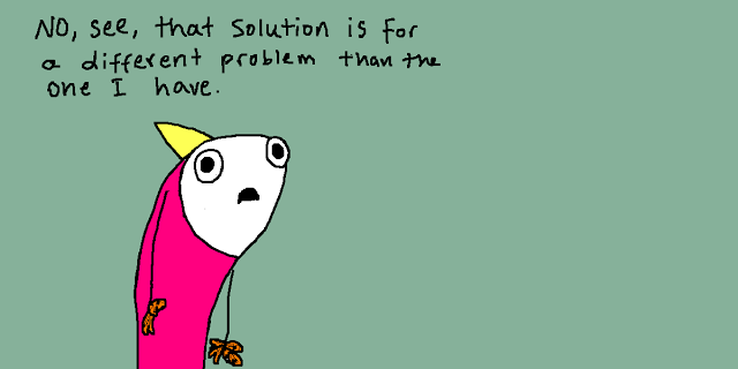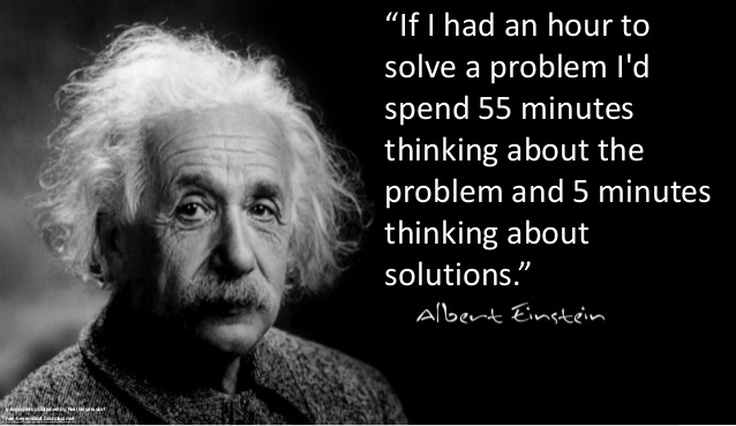|
I recently published 6 Things Men THINK They Know About Women... That Are Totally Wrong. Myth 6 was, "Learning if-then statements will help you better understand and connect with women." Because here's the thing: women aren't algorithms. Their values, just like their breast size and their hair color, vary dramatically from person to person. So your if-then statement is a recipe for disaster.
I gave a few examples of this in my post. But you want to know the worst one of all?
Myth 6.2: <If> a woman talks to you about her problems, <then> she's looking for a shoulder to cry on, not an actual solution.
Seriously, that is some of the most sexist bullshit ever. Yes, it may be true for some women, some of the time. It's also true for some men, some of the time (please refer to my previous point about toxic masculinity). You might even be bold and say it's also true for all people some of the time. Because sometimes, all people get frustrated about a situation they have little control over, and they need to vent. Or they want to help you understand what they're going through. Or... they simply need their feelings to be validated. After all, validation is the very first thing you learn about in Mediation and Conflict Resolution. For me, personally, I'm looking for pure sympathy/validation about... I dunno... 5% of the time? The other 95% of the time I, like most women, and like most people, am looking for solutions. For ways to improve myself or my situation. But even then! OBVIOUSLY. The OBVIOUS FIRST STEP... is to LISTEN. Because in order to come up with a solution to a problem, you need to understand the problem. This is true in business and science as well as in your interpersonal relationships. Because otherwise, it's just kind of like:
From Hyperbole and a Half.
But don't take it from me! Take it from Albert Einstein, who once said:
It's like kissing -- you've always got to follow the 90-10 rule!
Or, as Dwayne Spradlin, Buzz Points CEO and author of The Open Innovation Marketplace: Creating Value in the Challenge Driven Enterprise, wrote in the Harvard Business Review, Indeed, when developing new products, processes, or even businesses, most companies aren’t sufficiently rigorous in defining the problems they’re attempting to solve and articulating why those issues are important. Without that rigor, organizations miss opportunities, waste resources, and end up pursuing innovation initiatives that aren’t aligned with their strategies. So put away this stupid, useless stereotype. It's offensive, sexist, and untrue. Instead, remember that sometimes, people of all genders are looking for input/advice. And sometimes, people of all genders are looking for validation/sympathy. If you're not sure which of these your girlfriend/boyfriend/husband/co-worker/buddy/mother/brother wants, you know what's a really clever thing to do? ASK. "It sounds like you're going through some pretty complicated stuff right now -- I'd be upset, too! [<-- Validation] Do you want to tell me more about it, or do you want to think about possible solutions? [<-- Clarification of their intentions]" And don't forget: in business, and in life, if you don't fully understand the problem, you're probably going to come up with a stupid solution. Don't come up with stupid solutions. Take time to fully understand the problem, so you can come up with a smart solution.
0 Comments
Leave a Reply. |
About the Author

Eva is a content specialist with a passion for play, travel... and a little bit of girl power. Read more >
Want to support The Happy Talent? CLICK HERE!
Or Find me on Patreon!
What's Popular on The Happy Talent:
Trending in Dating and Relationships:
What's Popular in Science: Playfulness and Leisure Skills:
Popular in Psychology and Social Skills:
Categories
All
|




























 RSS Feed
RSS Feed